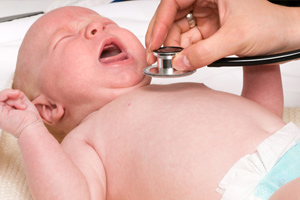AN Australian expert has described research that shows preterm infants are at a significantly higher risk of being hospitalised in young adulthood with a range of psychiatric disorders as “alarming”.
The research, published in the Archives of General Psychiatry, has identified a link between preterm birth and hospitalisation as a young adult for non-affective psychosis, depressive disorder and bipolar affective disorder. (1)
The researchers also found that the younger the gestational age at birth, the greater a person’s likelihood of hospitalisation for these disorders at age 16 years or over.
“Compared with term births (37–41 weeks), those born at 32 to 36 weeks’ gestation were 1.6 times more likely to have nonaffective psychosis, 1.3 times more likely to have depressive disorder, and 2.7 times more likely to have bipolar affective disorder”, they wrote after analysing the records of 1.3 million people born in Sweden between 1973 and 1985.
“Those born at less than 32 weeks’ gestation were 2.5 times more likely to have nonaffective psychosis, 2.9 times more likely to have depressive disorder, and 7.4 times more likely to have bipolar affective disorder.”
The association between preterm birth and psychiatric outcomes persisted after adjusting for a range of factors such as non-optimal fetal growth, low Apgar score, maternal sociodemographic characteristics, and maternal psychiatric history.
Associate Professor Peter Anderson, principal research fellow at Murdoch Children’s Research Institute and director of the Victorian Infants Brain Studies Team, described the findings as “alarming”, but not surprising.
He said children born very preterm had higher rates of attention deficit hyperactivity disorder, autism, cerebral palsy, intellectual difficulties and behaviour problems.
“They are at increased risk for impairment across most outcomes so, in that respect, it’s not surprising that they are at increased risk of severe psychiatric disorders.”
However, Professor Anderson said that long-term cohort studies in Victoria had not found evidence of increased levels of psychosis or bipolar affective disorder in children and young adults born preterm.
“I’m not sure whether that means that the onset is later. Maybe we need to wait another 5 years to see the onset of these conditions in our population.”
Professor Anderson said that while the Swedish study found the rate of severe psychosis in adults born very preterm to be elevated in contrast to term-born peers, it was still very rare.
Associate Professor Campbell Paul, child psychiatrist at Melbourne’s Royal Children’s Hospital, said it was important to be alert to the potential for mental health problems in children born preterm, without adding to a family’s anxiety.
“Parents [of very premature babies] are very anxious about the impact on brain and brain development, and by implication, mental health outcomes in the long-run, so they’re usually attuned to the level of risk that their young baby may experience as they grow up”, Professor Paul said.
“It’s a matter of providing very good health care all along the road and incorporating a sensitivity to mental health problems through childhood and adolescence and into adulthood.
“What you want to avoid is having young people grow up with the knowledge that they are at increased risk of [psychiatric disorders] unless there’s a really useful intervention you can provide at the time.”
Professor Anderson said he hoped the psychiatric outcomes shown in this study would not be seen in preterm children born more recently.
“Children born preterm today are quite a different group to the children who were born preterm in the 1970s and 80s”, he said.
“Back when these children were born, the chance of survival for children born very preterm was a lot lower than what it is today.”
Care in neonatal intensive care units had improved in the past 20 years, and there was much more opportunity for mothers and families to bond with their preterm babies.
“We are hopeful that outcomes are better in more recent cohorts of children born preterm and very preterm”, he said.
– Nicole Mackee
1. Arch Gen Psych 2012; 69: 610-617
Posted 12 June 2012

 more_vert
more_vert